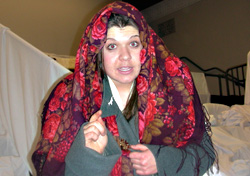There’s a phenomenon much described in early anthropological ethnographies concerning the way repressed groups tend to vent when out of their oppressor’s earshot. Slaves, women, peons, citizens of a totalitarian state—such subjugated populations often become adept at displaying a mask of public subservience that is bitingly and hilariously ripped off in private moments wherever the shat-upon aggregate. Joking and bitching about the czar’s police or the master’s whip become revolutionary acts, goads to some distant millennial future when the meek shall inherit the earth. At least, that’s the plan.
The dangerous and watchful expression of such public/private dichotomies provides the spark in Child of Hungry Times, a one-woman show by Seattle native Bridget Bailey, inspired partly by the writings of Russian author Lyudmila Petrushevskaya and directed by Duke University drama teacher Jay O’Berski. In a deft routine of nimble transformations and snapshot segues, Bailey adopts the personae of a half-dozen representative types, Russian women surviving with black humor and gritty tenacity under the omniscient eye of the pre-glasnost Soviet regime. What Bailey provides, more or less successfully, is a spy-in-the-house-of-hell perspective on the way people get through their day in a controlled society that observes their every move and listens in on every conversation—seemingly every self-guarded thought.
The show is narrated by an elderly Babushka, the only character written into the play by Bailey herself. With her head scarf and sweet, matronly manner, the Babushka gently guides the audience into the world of Petrushevskaya’s hard-boiled characters. At first, with her insistence on the openness and greatness of Russian society, she appears little more than a shill for Lenin’s social experiment. As she beckons toward a table lined with seats, Bailey pirouettes to assume a new character, becoming one moment a jaded, gravel-voiced sophisticate puffing on a cigarette, the next a mother whose life has been one long act of self-abnegation for her children’s sake. Bailey convincingly embodies each persona, giving a strong feel for the collisions of character and fate that mark a particular epoch—in this instance, the underground, mostly silent resistance of women surviving the mundane brutalities of the Soviet regime. By turns whispering or almost psychotically blustering, each of these characters reveals the perpetual strain of laboring under a universal mechanism of social control. Yet not is all bleakness and loss: as in the writings of Dostoyevsky, the women in Child of Hungry Times are given to angry and ribald speech that flings truth back at power, often simply through the recitation of the trials of everyday existence. Such litanies of struggle belie the Babushka’s claim that Russia is “the greatest country in the world.”
The dramatic arc of Bailey’s play is a slow process of disintegration, as the regime’s force-fed propaganda is eroded by the harsh realities of the women’s stories. The Babushka character acts as a lightning rod for these tales of hardship. She holds up only so long before she herself collapses under the weight of suffering and begins to rant, hesitantly at first, against the indignities of Soviet life. Cue the siren and the almighty Censor’s red strobe—literally. Bailey’s decision to dramatize the state’s all-seeing, all-powerful grip so blaringly, while dramatically jarring, somewhat undermines the subtle emotional force she cultivates in her individual portraits of Soviet life. She establishes Chekhov, then hits us over the head with a three-ring circus. This is the show’s only real weakness, and it explains Bailey’s unwillingness to let the audience draw its own conclusions about the similarities between Soviet oppression and our current administration’s arrogant mangling of due process and individual protections ensured by the Bill of Rights. No need for Babushka to whisper that Russia isn’t the only country that spies on its citizens.
Such heavy-handed gestures, however, in no way detract from the pure talent Bailey displays in creating her gallery of characters. The actor has a unique way of personalizing her vision, bringing the women into the audience’s direct line of sight. At one point, as Bailey delivers a monologue on making do, she wanders into the audience, picking up raw potatoes that have been deposited at each seat. It’s an affecting moment, and it captures the directness and energy with which she plies her wares. Such gestures of faith are what make Child of Hungry Times worthwhile.








